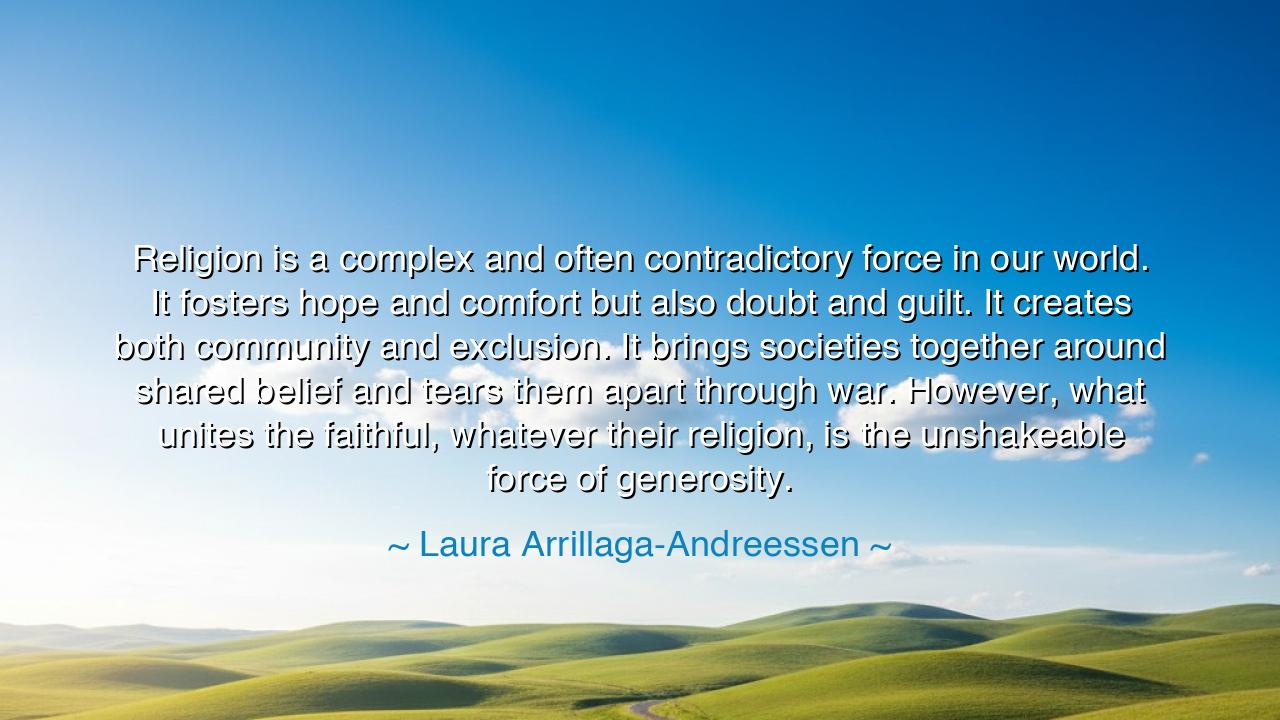
Religion is a complex and often contradictory force in our world.
Religion is a complex and often contradictory force in our world. It fosters hope and comfort but also doubt and guilt. It creates both community and exclusion. It brings societies together around shared belief and tears them apart through war. However, what unites the faithful, whatever their religion, is the unshakeable force of generosity.






“Religion is a complex and often contradictory force in our world. It fosters hope and comfort but also doubt and guilt. It creates both community and exclusion. It brings societies together around shared belief and tears them apart through war. However, what unites the faithful, whatever their religion, is the unshakeable force of generosity.” Thus spoke Laura Arrillaga-Andreessen, a thinker and philanthropist who looks not at religion from the pulpit, but from the human heart. Her words rise like a mirror held to history itself, reflecting both the light and shadow of faith. For in this declaration lies a profound truth: that religion, though vast in form and divided in doctrine, is bound by one universal current—the force of generosity, the sacred impulse to give, to serve, to love beyond oneself.
Religion, she reminds us, is complex and contradictory, because it is born of humanity itself. It holds within it the full spectrum of human longing—the yearning for meaning, the fear of the unknown, the need for belonging, and the drive to transcend. It is capable of inspiring the highest good and the deepest sorrow. It comforts the sick, feeds the hungry, and lifts the fallen; yet it has also been used to justify conquest, oppression, and division. Arrillaga-Andreessen does not condemn it nor glorify it—she beholds it with the eyes of truth. For religion is not a monolith of perfection, but a mirror of the heart: whatever lies within man—hope, love, fear, pride—will find expression within his faith.
Her words echo through the corridors of history. We can recall the beauty of Saint Francis of Assisi, who abandoned wealth to live in poverty and compassion, tending to lepers and creatures of the wild; and in the same breath, we remember the Crusades, when men marched beneath the cross, claiming to serve God while bringing fire and sword to others. We think of Gandhi, who drew strength from Hinduism to preach nonviolence and peace, and of those who, in the same faith, have fueled hatred and exclusion. In all ages, religion has stood as a double-edged sword—its edge capable of healing or harming, depending upon the hand that wields it.
Yet Arrillaga-Andreessen draws our gaze toward what endures: the unshakeable force of generosity. She sees that beneath the divisions of creed, beneath the endless debates of doctrine, there is one river that runs through all faiths—the call to give. Whether it is charity in Christianity, zakat in Islam, dāna in Buddhism, or seva in Hinduism, each religion honors the sacred act of selflessness. The truest mark of faith is not in how we pray, but in how we serve. When a heart gives freely, it transcends all boundaries; it becomes a vessel of the divine. Thus, generosity is not merely a virtue—it is the bridge between humanity and heaven.
Consider the story of Mother Teresa of Calcutta, who walked among the dying and the destitute, seeing in each face the image of God. Though rooted in Catholic faith, her compassion became a universal language, recognized by believers and unbelievers alike. When asked how she endured such suffering, she said, “I see Christ in every person I serve.” In her, the contradictions of religion dissolved into clarity—faith became action, love became service, and generosity became prayer. Her life was proof that while doctrines may differ, the impulse to give is divine and eternal.
But Arrillaga-Andreessen’s message is not confined to saints or clergy; it is for all who walk this earth. She calls us to recognize that generosity—the act of reaching beyond oneself—is not the property of any faith, but the shared inheritance of all humanity. In every age and every culture, the giving hand is the hand of God, whether it builds a mosque, feeds a stranger, or comforts a grieving soul. The wise understand that generosity is the truest form of worship, for it transforms belief into being.
So, O seeker of wisdom, take this lesson to heart: do not be blinded by the quarrels of creed, nor disheartened by the hypocrisy of men. Look instead to the acts of kindness that endure beyond all words. If religion confuses you, let generosity be your compass. Give to others—your time, your care, your strength—not for reward, but for love itself. For in giving, you honor the divine spark that lives within all people.
Thus, as Laura Arrillaga-Andreessen teaches, though religion may divide through doctrine, it unites through generosity. Let this truth be your guiding star: that faith is not proven by what one declares, but by what one gives. When you open your heart to another, you join hands with saints and sages across all ages. You become part of the eternal thread that binds humanity together—the thread woven not by belief, but by love in action, by hope made tangible, by the unshakeable force of generosity.






AAdministratorAdministrator
Welcome, honored guests. Please leave a comment, we will respond soon